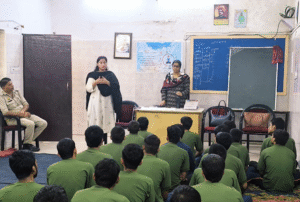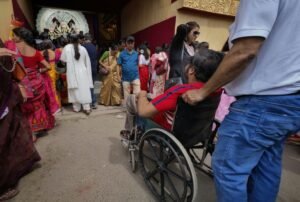
Back to Our Work
Supreme Court Upholds Digital Accessibility as a Fundamental Right

In a groundbreaking judgement, the Supreme Court of India has struck down discriminatory digital verification systems and mandated inclusive Know Your Customer (KYC) guidelines across public and private institutions. The ruling which comes in response to a PIL filed by iProbono India on behalf of nine acid attack survivors, has redefined the constitutional right to life and liberty for the digital age.
This pivotal ruling affirms digital accessibility as a constitutional right under Article 21, setting a powerful precedent for inclusive governance in India’s rapidly digitising society.
The Case
The petition challenged the exclusionary “liveness test”—a standard biometric verification method requiring individuals to blink for live photo authentication. Under the current system, many individuals with facial disabilities or disfigurements encounter significant obstacles when trying to open bank accounts, obtain SIM cards, or access other essential services.
Pragya Prasun, one of the petitioners and founder of Atijeevan Foundation, knows the impact of this exclusion deeply. Marking 19 years since she survived an acid attack, Pragya called the judgement “a personal milestone and a beacon of hope.”
“I’m so happy and grateful, but there’s still a long way to go. Implementation is most important,” she said. “I want this day to be remembered for my survival. This judgement gives me hope.”
iProbono India’s Commitment to Disability and Inclusion
Led by Sr. Adv. Siddharth Luthra, iProbono India’s panel lawyer Nitin Saluja and legal team including Nimisha Menon and Yamina Rizvi, the petition was grounded in close consultation with disability rights experts and technology experts. It urged the Court to recognise how digital protocols were excluding thousands based on ability.
The case was first acknowledged by a bench headed by the then Chief Justice of India, Justice D.Y. Chandrachud, and the final judgement was delivered by Justice J.B. Pardiwala and Justice R. Mahadevan.
“This verdict is not just a legal win – it’s a constitutional milestone,”
– said Nimisha Menon, Program Manager, iProbono India.
“It affirms that for persons with disabilities, digital access is a right—not a privilege,”
– added Yamina Rizvi, Senior Program Officer, iProbono India.
What the Judgement Says
The Court unequivocally declared that “bridging the digital divide is no longer a matter of policy discretion but a constitutional imperative.” The ruling reinterprets the Right to Life (Article 21) to include digital access as essential to autonomy, dignity, and equal participation in public life.
The Way Forward: 20 Directives for Inclusion
The Court issued 20 comprehensive directions to regulatory bodies including the Union of India, Reserve Bank of India, Ministry of Electronics and Information Technology (MeitY), Telecom Regulatory Authority of India, Department of Telecommunications, Ministry of Finance, and the Securities and Exchange Board of India to ensure digital systems are accessible. These include:
- Accessibility Standards: All government and private regulated entities (REs) shall follow prescribed digital accessibility standards; each department must appoint a nodal officer for compliance.
- Audits & Inclusive Testing: All Regulated Entities (REs) shall undergo periodic accessibility audits; persons with visual impairment must be involved in user acceptance testing.
- Alternative KYC Methods: RBI shall issue guidelines to all REs to adopt and incorporate inclusive digital KYC methods to verify “liveness” or capturing a “live photograph”, beyond blinking-based liveness detection.
- Video KYC Flexibility: RBI shall clarify that blinking is not mandatory in procedures under KYC norms.
- Disability Data in KYC: KYC forms must capture disability details to enable reasonable accommodations.
- Thumb Impressions: REs must accept thumb impressions during digital KYC.
- Enhance OTP-based KYC: RBI must promote face-to-face OTP-based e-KYC.
- Paper KYC Option: Paper-based KYC must remain available as an accessible alternative.
- Accessible Communication: Sign language, closed captions, audio descriptions for visually and hearing impaired users,
- Braille and voice formats must be offered for all public communications and services.
- ICT Compliance: All ICT products must comply with Bureau of Indian Standards accessibility standards.
- Inclusive Digital Services: E-governance, digital payments, and platforms must be accessible to persons with disabilities.
- Website Standards: All government digital platforms must comply with Web Content Accessibility Guidelines, Guidelines for Indian Government Websites (GIGW), and Section 46 RPwD Act standards.
- CKYC Sharing: All authorities shall set up a mechanism to allow authorised sharing of KYC data across entities via CKYCR.
- Grievance Redressal: A dedicated system for disability-related accessibility issues must be created.
- Human Review of Rejections: KYC rejections due to accessibility issues must be reviewed and overridden by a designated human officer.
- Disability Helplines: Dedicated voice/video helplines must guide users through the KYC process.
- Awareness Campaigns: RBI must run public campaigns to promote alternative KYC methods.
- Staff Training: Disability awareness must be part of staff training in REs.
- Monitoring by RBI: RBI must ensure compliance with these directions and related regulations
This victory is part of iProbono India’s larger mission to advance justice, dignity, and equity for marginalised communities, including persons with disabilities. Through litigation, policy advocacy, and partnerships with survivors and civil society leaders, we strive to make systems work for everyone.
You can read the judgement here.











